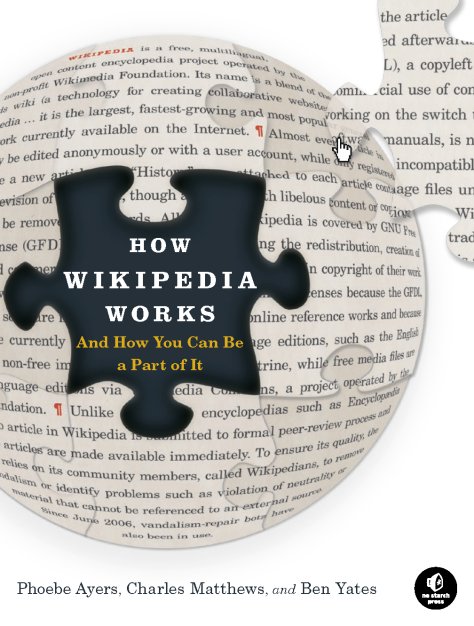
Kevin Kelly has written:
The Wikipedia is impossible, but here it is. It is one of those things impossible in theory, but possible in practice.
I couldn’t agree more: the scope of Wikipedia’s success is stupefying to me. The project can teach us many things about how we can utilise small inputs from many to create something grand.
Ayers, Matthews and Yates have written How Wikipedia Works: And How You Can Be a Part of It and made it a free cultural work by licensing it under the GNU Free Documentation License. The complete book is freely available online at http://howwikipediaworks.com/.
They have managed to truly deliver on both meanings of the title. The book gives an in-depth explanation of how Wikipedia literally works (i.e. the syntax, the software, categories, templates and more) and how it can work as a community based collaborative effort (through philosophies, guidelines, processes and policies).
After reading it, I now have a much better understanding of the project as a whole, including the other Wikimedia projects, while also understanding that there is much more to learn about the five pillars of Wikipedia which summarise Wikipedia as a website, a mission and a community:
- Wikipedia is an encyclopedia (not anything else).
- Wikipedia has a neutral point of view.
- Wikipedia is free content that anyone may edit. (All Wikipedia content is freely licensed and free of charge, and content is freely editable.)
- Wikipedia had a code of conduct. (Editors should behave civilly toward each other, this includes my favourite: Assume good faith)
- Wikipedia does not have firm rules. (The editing community can change the rules, this is also known as Ignore all rules).
The book is very valuable for educators. One of the best chapters outlines how to evaluate the quality of an article. By using different techniques, including looking at the history of a page, checking the backlinks to an article, taking account of the warning messages and verifying the sources, you can quickly judge the value of the information (for more on this see Researching with Wikipedia). Teaching students how to do this could push the discussion about allowing students to use Wikipedia as a source for research to another level. Even more interesting is make working on Wikipedia an assignment for your students. If I was teaching in tertiary education right now, I would be sure to do this. It will teach students more valuable skills than an essay only written for the professor’s eyes could ever do. There is group of Wikipedians happy to help and set up these kind of projects.
In short: read this book!
Finally two random (but Wikipedia related) links that I enjoyed and want to share with you:
- Pediapress. A print on demand service for selections of Wikipedia articles. Create your own books by picking the articles you like to have in it and have it shipped to you for a very reasonable price. Selections by others are available through their catalogue. Try Educational Technology for example.
- An interesting essay, found through the book, about avoiding instructional creep:
The fundamental fallacy of instruction creep is thinking that people read extremely long, detailed instructions. What’s more, many bureaucracies also arise with the deliberate intent to be alternatives to regulations; this is almost always noticed by the other side, and tends to antagonize.
Something to always stay aware of!